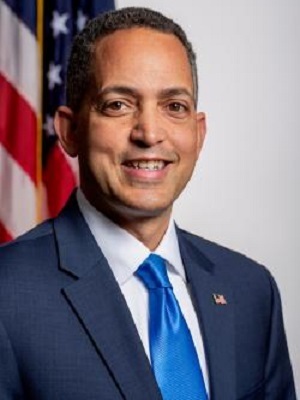U.S. Department of Commerce Deputy Secretary Don Graves recalled aspirations of fallen civil rights advocate Martin Luther King Jr. during a recent appearance in Maryland.
Graves paraphrased King in his remarks during a roundtable discussion about digital equity in Baltimore on Jan. 15, two days before Martin Luther King Jr. Day as observed this year.
"Equity has been a day one priority for this administration and underpins everything we do at the Commerce Department," Graves said in a news release. "A central part of these efforts is achieving digital equity by closing the digital divide."

U.S. Commerce Deputy Secretary Don Graves
| commerce.gov/
Graves referred to the President Joe Biden administration's Bipartisan Infrastructure Law for moving the nation "closer to that ambitious goal" of making sure everyone in the United States can access affordable, high-speed internet. The law provides $65 billion to expand broadband to unserved and underserved areas.
"Doing so ensures that we can not only better compete on the world stage, but also make good on the promise of our democracy, as Dr. Martin Luther King Jr. prescribed," Graves said.
Graves, who in May of last year became the Commerce Department's 19th deputy secretary, was joined at the roundtable by U.S. Senators and Maryland democrats Ben Cardin and Chris Van Hollen, along with Baltimore Mayor Brandon Scott. Also attending were Historically Black College and University presidents and representatives.
The roundtable to convened to discuss digital equity, with a focus on closing the digital divide.
Born in Atlanta in 1929, King was the son of a Baptist preacher and he received a doctorate degree in theology before 1955, when he organized the successful Montgomery Bus Boycott. King's policy of nonviolent resistance was influenced by Mohandas Gandhi, who used the same strategy a generation before in an ultimately successful campaign to win India's independence from British rule.
King many times used his skills as a talented orator, including one of his most famous speeches, now best know as his "I have a dream" speech that he delivered on the steps of the Lincoln Memorial in August of 1963. In that speech, King famously announced, "I have a dream that my four little children will one day live in a nation where they will not be judged by the color of their skin but by the content of their character."
In 1964, when King was 35, he received the Nobel Peace Prize for his work in the Civil Rights Movement. He remains the youngest man to have ever received the award and was the youngest person until girls rights and education advocate Malala Yousafzai received the Nobel peace laurel at 17.
King donated his Nobel prize money, more than $50,000, to further civil rights advancement.
In April of 1968, King was in Memphis to support striking sanitation workers when he was assassinated while standing on a balcony of the Lorraine Motel. He was 39.
Roundtable participants noted the increasing need for a cybersecurity workforce in Maryland and discussed a proposed pipeline to remove barriers and create a more diverse field, according to the news release.
"The Economic Development Administration's Build Back Better Regional Challenge has made geographic diversity and equity a top priority," Graves said. "These investments, made available by EDA through President Biden's American Rescue Plan, will not only spur regional economic development in these communities, but will also create the economic infrastructure and ecosystem our country needs to ensure its global competitiveness and create jobs of the future."









